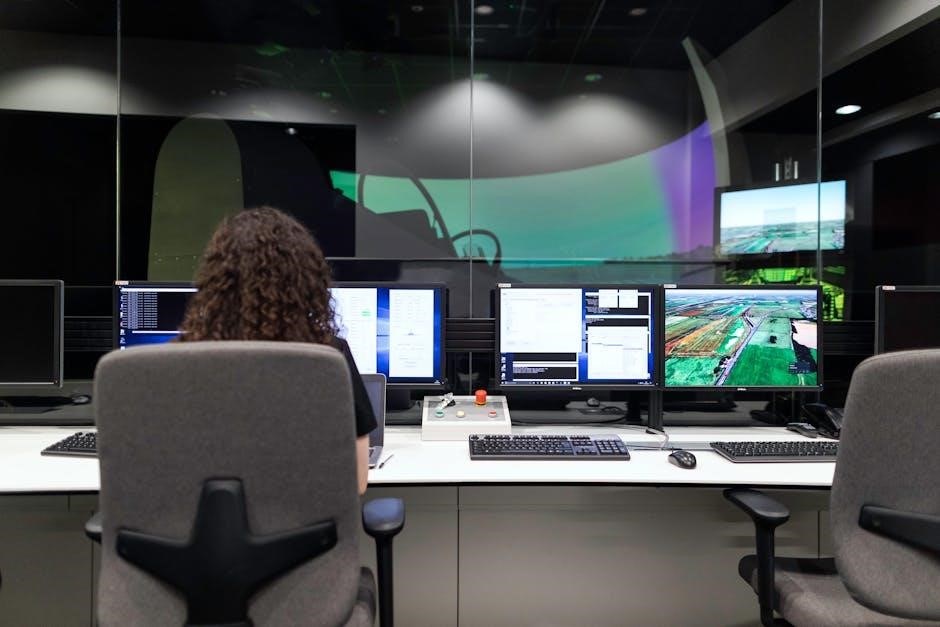The MS Computer Science Entry Test MCQs PDF is a comprehensive guide for aspirants, covering essential topics like programming, data structures, and mathematics. It offers practice questions, detailed explanations, and sample tests to help candidates prepare effectively for their admission exams. This resource is designed to enhance problem-solving skills and familiarize students with the exam format, ensuring they are well-equipped for the challenges of the test.
Importance of MCQs in Admission Tests
MCQs play a pivotal role in admission tests for MS Computer Science programs, as they assess a candidate’s knowledge, analytical skills, and ability to think critically under time constraints. These questions cover a broad range of topics, ensuring a comprehensive evaluation of the applicant’s understanding of computer science fundamentals, mathematics, and English proficiency. MCQs also help universities identify candidates who can apply theoretical concepts to practical problems, making them a fair and efficient tool for competitive admissions. Regular practice with MCQs enhances problem-solving speed and accuracy, which are crucial for success in such exams.
Overview of the MS Computer Science Entry Test
The MS Computer Science Entry Test is a 150-minute exam consisting of 100 multiple-choice questions (MCQs). It assesses candidates’ knowledge in English, Mathematics, and Computer Science core areas. The test evaluates understanding of programming concepts, data structures, algorithms, databases, and operating systems; Designed to identify candidates with strong analytical and problem-solving skills, it serves as a critical tool for admissions into prestigious MS and PhD programs in Computer Science. The structured format ensures a fair evaluation of both theoretical and practical expertise.

Exam Structure and Pattern
The MS Computer Science Entry Test is a 150-minute exam with 100 MCQs. It includes sections on English (25%), Mathematics (25%), and Computer Science (50%).
Weightage Distribution of Sections
The MS Computer Science Entry Test is divided into three sections: English (25%), Mathematics (25%), and Computer Science (50%). The Computer Science section is further split into Basic Programming & OOP (20%), Data Structures (15%), Databases (10%), and Operating Systems (5%). Understanding this distribution helps candidates allocate study time effectively, focusing heavily on core computer science topics due to their higher weightage in the exam. This balanced structure ensures a comprehensive assessment of both foundational and advanced knowledge.
Types of Questions and Time Management
The MS Computer Science Entry Test includes 100 MCQs, with a time limit of 150 minutes. Questions range from basic recall to applied knowledge and analytical problems. Candidates should allocate time strategically, spending about 1.5 minutes per question. Prioritize skimming through easier questions first to secure initial marks, then focus on challenging ones. Effective time management is crucial to attempt all questions, ensuring a balanced approach across all sections. Practice with sample tests helps refine this skill, enhancing overall performance and confidence during the exam.

English Section MCQs
The English section assesses grammar, vocabulary, reading comprehension, and sentence completion skills. It evaluates candidates’ ability to understand and analyze texts, ensuring strong communication skills for academic success.
Grammar and Vocabulary Questions
Grammar and vocabulary questions in the MS Computer Science Entry Test MCQs PDF focus on testing candidates’ language proficiency. These questions include identifying correct sentence structures, antonyms, synonyms, and appropriate word usage. They also assess the ability to comprehend and correct grammatical errors. Vocabulary questions cover a range of topics, from basic to advanced, ensuring candidates have a strong command of English. Proper use of tenses, subject-verb agreement, and punctuation are also emphasized to evaluate linguistic accuracy and clarity in communication.
Reading Comprehension and Sentence Completion
Reading comprehension questions assess the ability to understand and interpret complex texts, while sentence completion tests grammar and vocabulary skills. Candidates are required to read passages, identify main ideas, and answer questions based on the content. Sentence completion involves filling in blanks with appropriate words, ensuring grammatical accuracy and context relevance. These questions evaluate critical thinking, attention to detail, and language proficiency. They are designed to ensure candidates can comprehend academic texts and express ideas clearly, which are essential skills for advanced studies in computer science.

Mathematics Section MCQs
The mathematics section focuses on foundational concepts such as algebra, calculus, probability, and statistics. It evaluates problem-solving skills and the ability to apply mathematical principles to real-world scenarios effectively.
Algebra and Calculus Questions
Algebra and calculus questions form a significant part of the mathematics section in the MS Computer Science entry test. These MCQs assess understanding of algebraic manipulations, equations, and calculus concepts like differentiation and integration. They require problem-solving skills and the ability to apply mathematical principles efficiently. Proper time management and practice are essential to tackle these questions effectively during the exam. Candidates should focus on solving various practice problems to build confidence and accuracy in these areas. Regular review of calculus and algebra fundamentals is highly recommended for success.
Probability and Statistics Concepts
The probability and statistics section evaluates understanding of foundational concepts like probability distributions, Bayes’ theorem, and statistical measures. Questions may involve calculating probabilities, interpreting data, and applying statistical techniques. These MCQs require a strong grasp of theoretical concepts and their practical applications. Regular practice with sample problems and review of formulas are essential for mastering this section. Candidates should focus on understanding key concepts and improving their ability to solve problems efficiently within the given time constraints.

Computer Science Core Areas
The core areas of computer science include programming, data structures, algorithms, databases, and operating systems. MCQs cover these topics, assessing theoretical understanding and practical problem-solving skills effectively.
Basic Programming and OOP Concepts
MCQs on basic programming and OOP concepts test fundamental knowledge of variables, loops, and control structures. Questions also cover object-oriented principles like encapsulation, inheritance, and polymorphism. Candidates must demonstrate understanding of class diagrams, constructors, and destructors. Practice MCQs help reinforce these concepts, ensuring a strong grasp of programming basics and OOP principles essential for advanced studies in computer science.
Data Structures and Algorithms
Data structures and algorithms are critical components of the MS Computer Science entry test. MCQs cover topics like arrays, linked lists, stacks, queues, trees, and graphs. Algorithms such as sorting, searching, and graph traversal are frequently tested. Questions assess understanding of time complexity, space complexity, and the efficiency of different approaches. Practice MCQs help candidates master these fundamental concepts, ensuring they can apply them to solve complex problems effectively during the exam.
Databases and Operating Systems
Databases and operating systems are essential topics in the MS Computer Science entry test. MCQs cover fundamental concepts such as database normalization, SQL queries, and storage management. Operating systems questions focus on process management, memory allocation, and file systems. Candidates are also tested on scheduling algorithms and concurrency control. Practice MCQs help students understand these core areas, ensuring they can apply theoretical knowledge to practical scenarios effectively during the exam.

Preparation Strategies
Effective preparation involves solving previous years’ MCQs, using recommended textbooks, and practicing online tests. Focus on understanding concepts, managing time, and improving problem-solving skills systematically.
Recommended Study Materials and Resources
Practice Tests and Online Platforms
Engaging with practice tests and online platforms is crucial for effective preparation. Websites like “Computer Science MCQs Test Online” and “50000 Computer Science Multiple Choice Questions & Answers” provide extensive practice material. Platforms such as Coursera and edX offer courses with quizzes and assessments. Regularly taking timed mock tests helps simulate exam conditions, improving time management and accuracy. Additionally, online forums and discussion groups allow candidates to clarify doubts and learn from shared experiences, enhancing their problem-solving skills and confidence. Utilize these resources to refine your approach and achieve better results.

Common Mistakes to Avoid
Common mistakes include poor time management, overthinking, and skipping questions without attempting. Candidates must avoid these errors to maximize their scores and ensure accurate responses.
Time Management During the Test
Effective time management is crucial during the MS Computer Science entry test. Allocate 1-2 minutes per MCQ to ensure completion within the allotted time. Avoid overthinking and move to the next question if stuck. Prioritize high-weightage sections like Computer Science core areas. Skip complex questions initially and return to them later. Use elimination techniques to guess answers when necessary. Practice mock tests to refine your pacing and decision-making under pressure. Proper time distribution ensures balanced attempts across all sections, maximizing your score potential.
Understanding Question Patterns
Understanding question patterns is vital for success in the MS Computer Science entry test. Familiarize yourself with the types of MCQs, such as problem-solving, conceptual, and application-based questions. Analyze past papers to identify recurring themes and formats. Focus on high-weightage areas like programming, data structures, and algorithms. Practice interpreting diagrams, flowcharts, and theoretical explanations. Recognize common distractors and eliminate incorrect options to increase accuracy. Regularly solving sample MCQs helps refine your ability to decode patterns and approach questions systematically.

Sample Questions and Answers
The section provides a variety of sample MCQs covering English, Mathematics, and Computer Science. Each question includes detailed explanations to enhance understanding and improve preparation efficiency.
English and Mathematics Sample MCQs
The English section includes grammar, vocabulary, and reading comprehension questions, while Mathematics focuses on algebra, calculus, and probability. Sample MCQs like identifying antonyms or solving algebraic expressions help candidates understand question patterns. Mathematics questions often involve problem-solving, such as calculating probabilities or simplifying expressions. These samples provide insights into common exam topics, enabling focused preparation. By practicing these MCQs, candidates can improve their accuracy and time management skills, ensuring better performance in the actual test.
Computer Science Sample MCQs
Computer Science sample MCQs cover core areas like programming, data structures, and algorithms. Questions test knowledge of OOP concepts, databases, and operating systems. For example, “Which function cannot be overloaded in a class?” or “What is the purpose of a data flow diagram?” These MCQs help assess understanding of key concepts and problem-solving skills. Regular practice with these questions ensures familiarity with common exam patterns and improves readiness for the actual test. They are essential for mastering the technical aspects of the entry test.

Mastering the MS Computer Science entry test requires consistent practice and a deep understanding of core concepts. Utilize MCQs and practice tests to refine your problem-solving skills and time management. Focus on key areas like programming, data structures, and algorithms. Review sample questions to familiarize yourself with the exam format. Stay confident, and with dedicated preparation, you’ll achieve the desired results. Remember, thorough revision and strategic planning are key to success in the entry test.